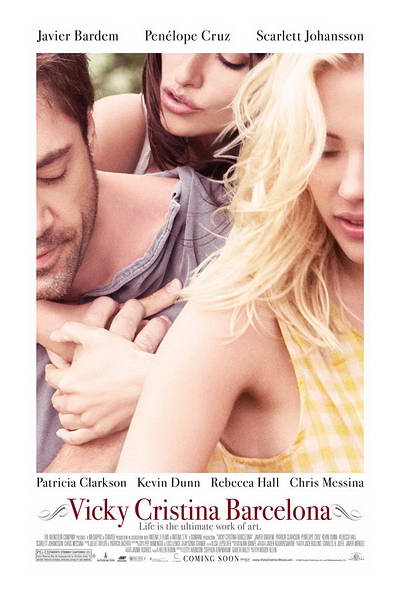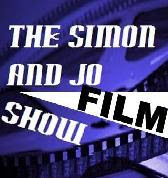 "Maria Elena used to say that only unfulfilled love can be romantic"Introduction
"Maria Elena used to say that only unfulfilled love can be romantic"Introduction
Like most of us bloggers - who love movies but don't get paid to watch them - I had only seen this once when I rated it third best film of 2009. I watched it soon after Christmas and, I must say, it remains as high as it was. Contrary to other views - Nick James' coverage of Cannes in 2008 claimed
Vicky Cristina Barcelona as "another clunky, ham-fisted comedy from the fading genius" and he continues, stating that "the story fizzles out as you knew it always would". Nick James - why are you so cruel? Even recently, on the podcast, Jo claimed this was one of the worst pay-offs in history - the Cruz-Johannsson kiss. I completely disagree. In my chart it is good enough that, in time, it could potentially climb higher. I adore this film. As some of you may know, I'm an Art teacher - I graduated in Fine Arts, focussed on oil-painting portraiture and art history. The creative mind and what makes creativity - and the completely intertwined attitudes to love, romance and sex that art has is something I find true and fascinating. To add to it, prior to watching
Vicky Cristina Barcelona I was going through a semi-Woody Allen phase and managed to watch a bunch of his movies over a short period.
Sensual and SexualThe big sell of this film - not that it was what pulled me to the film - was the kiss between Johansson and Cruz. It's not the centre piece - but anyone who feels that this type of thing is worth hunting down is clearly someone who also, potentially, wants to understand sexuality and attraction (How do they make her attracted to her? etc) - or they are perv's. This film does answer that question, but also changes the perception of such an attitude (attraction to sexuality and attraction to another person) and challenges these expectations - the long-term and short-term nature of these attitudes. Cristina (Johansson) follows instinct and attraction - she is prepared to challenge her views and accept others. A true liberal. But alas, like anything in the world, experience can hurt and sometimes forces you to face who you truly are. Cristina values art - she wants to be art - as an actress. She turns to photography but only rates herself when accepted by others - much like acting. Can you act a role on your own for the sake of yourself and no audience? Cristina needs an audience and therefore needs acceptance and acknowledgment. Praise and support. But, when she is expected to be self-sufficient, she retreats to comfort, to something she knows and understands. Hence, inevitably perhaps, her self-analysis, pushes her away from the artistic central romance between Juan-Antonio (Bardem) and Maria-Elena (Cruz).
Commitment-phobia
I always get frustrated when someone claims they are 'just like Chandler' from Friends. Chandler - who was infamous for having a phobia of commitment. By labelling yourself under his banner, you think you are funny and self-effacing - who is ever going to be as arrogant to believe they are Joey? Who is going to want to admit being anything close to psycho-geek Ross? Whatever the case, the nature of commitment is interesting - and whenever we watch these films and television programmes - especially like Vicky Cristina Barcelona, inevitably, we draw comparisons and have to consider where we stand.
Are you like Vicky? Secure in her attitude towards relationships - proud of her planning and future, set out in stone, in front of her. Or are you like Cristina? Expecting to find love - not worried about defining love, just knowing what it is. This attitude is set up in the opening as the two arrive in Barcelona. The two explore options and explore possible choicses in their life but, by the end, remain believing what they initially felt: fear of embarressment, fear of commitment, fear of unplanned eventuality, a fear of some sort stops them from 'seeing through' their instincts and and attitudes.
But, when comparing yourself to the characters, there is a third choice - are you like Maria-Elena? Completely free in her artistic ambition. The 'true' genius - the genius who Juan-Antonio apparently takes his ideas from. The nature of commitment and love are tangible to her - the arguments are not wanted and the consequence of these arguments are not discussed. She acts how she feels without any foresight into how her attitudes affects others. This comes to the forefront at the climax as her 'emotions' become dangerous, wounding Vicky. Juan-Antonio is similiar in that respect - his perfection flawed by his lack of concern over other people. What about Vicky's husband? Does he consider him when he flirts with Vicky? No - the 'unartistic' have nothing compared to the passion of Juan-Antonio. His selfish 'discovery' and pride is what forces Vicky to leave - he is frustrated as he doesn't now how to balance his emotions and, as Vicky is rational and will plan, Juan-Antonion is irrational and acts on emotion. That is who they are. The tragic finale - as Vicky and Juan-Antonio are clearly not meant to be -fits perfectly in fiction and makes us, as a viewer, that much more involved.
Our Involvment
As an audience, what makes us more involved is the true-to-life nature of Vickys relatives: Judy and Mark. We might relate on a wishful level with the primary characters - but there is no connection to the world we live in. I don't know about you - but I haven't got the finances to just paint and create day in, day out (the best I have is some small sketches as I how 30 twelve year-old kids how to cross-hatch), and I have not got any relatives with the beautiful pad in Barcelona (Limerick? anyone?) - but the fact is, Judy and her husband Mark have been together for a long time and we know these comfortable figures - work colleagues or, dare I say it, parents. Judy and Vicky, discussing Judy's infidelity, is an incredible scene as Patricia Clarkson's Judy has to face-up to what she has done. Mark and Doug's only crime is a lack of creativity - they are not bad people. Judy knows this but is too far in - the romance and lust outweighed the security and comfortable marriage she is in. But is this experience going to impact on Vicky? Would it impact on you? There is something so real about Judy confessing her sins to Vicky - and even, when Vicky is shot in the hand, the completely ridiculous nature of the situation suddenly appears and the anger at herself - moreso than Juan-Antonio - and the trust she has betrayed of Dougs is the biggest concern. Those few seconds post-shooting, Vicky believes her entire futrure has changed and she is suddenly positive that is not what she wants - realigning herself with Doug and the family and life she and Doug had planned. Luckily, Doug is clueless and believes her lie.
ConclusionWe stay with Barcelona as long as Vicky and Cristina - we are with them for the ride. They arrive and leave witht he same perspective so, the cynics out there could feel a bit used. The 'space-time' continuum is disrupted by Juan-Antonio, but alas, by the end we are where we were. Akin to Michael Mann's starting and ending at a different airport (see Collateral and Heat) this does the same, beginning and ending at the same escalator.
Personally, I try and understand Juan-Antonio. Is he real? Is he an amalagamation of a fantasy guy - the most romantic man in the world - or are we supposed assume he exists? Furthermore, if he does exist, is he insane? The world he tries to balance - his destructive relationship with Maria-Elena (she stabbed him!) ... the proposition to Vicky and Cristina ... these are not normal situations. Then this begs the question about artists. What is an artist? Juan-Antonio and Maria-Elena clearly are artists ... but they have insecurities to say the least. Is Cristina an artist? Or, inside, are we all artists? Vicky has romantic expectations but gave up on them. Judy wants the romantic world of Barcelona - and the infidelities. Maybe it serves as a warning to ignorant men of the world: Appreciate romance and passion and, ultimately, art in the widest possible sense of the word - otherwise suffer the consequences as, inevitably, people will crave the art from somewhere, and settle for the romance from someone else.
I just re-read the last paragraph, it might not work. It seems a weak finale to the bastard post I have been writing and re-writing for god knows how long. But, enough is enough. I shall inevitably revisit Vicky Cristina Barcelona and, when I do, I may make a few adjustments ... until then ...





